Reflections from the School for Poetic Computation, weeks 1-3
introduction
I am one of the students at the School for Poetic Computation for the spring 2018 term. We are three weeks into the ten week long program as I write this first reflection. I make no attempt to be comprehensive in this entry, nor do I plan to do so in future entries. That said, I hope that some of the incomplete thoughts I do capture are of interest to others, whether because of some connection to SFPC, because of a general interest in art and technology and politics, or for some other reason. While I will keep the focus on SFPC itself, a little background and some of the other activities I engage in are necessary components of the story.
coming here
As recently as four days before our session began on February 20th, I was working as a programmer at Khan Academy, remotely from my home in Crown Heights, Brooklyn (and frequently from other locations, according to my schedule). The job was relatively good, but ultimately its positive aspects were overpowered by my specific distaste for the software industry and my general opposition to capitalism. In my view, capitalism operates in somewhat differing but complementary and ultimately similar ways within both non-profit and for-profit organizations, as both are accountable to the capitalist class and not to the communities they operate in. I may write more about that some other time, or maybe others have already covered the topic comprehensively enough.
Previously, I attended several short workshops here at SFPC as well two weeks of night classes last summer at a session called Code Narratives, where I created a rhyme generator based on the lyrics of my favorite rapper; that project was one of the many occasions that prompted me to consider the relationship between technology and imperialism, which you can read more about at that link. Anyway, my previous positive experiences here were a major part of why I chose to apply for the full-time program I’m enrolled in now.
I’m not exactly sure how I first heard about the school for poetic computation. I believe it must have been at the Recurse Center during my first batch during the summer of 2013, because I attended SFPC’s opening party sometime late that summer or that fall, when their space was in downtown Brooklyn (it’s now in the West Village). I didn’t go to anything else at SFPC until 2017. I don’t remember how I heard about it again or decided to go to the first weekend workshop I attended while I was still working full-time. But I’m very glad I did!
onboarding week
For a more comprehensive look at our activities during the first week, see SFPC’s official blog post, written by my friend and fellow student Yeli.
Our first week together entailed a lot of getting to know each other and the space. As the above-linked introductory post details, we are eighteen students altogether this term, along with seven teachers, two guest teachers, and four teaching assistants. The first week was a relaxed introduction to an intensive experience. Besides structured activities, such as the human fax machine exercise and inventing games related to binary numbers (described in the above post), we had quite a bit of time free to begin building relationships and discuss our common and unique interests. They are many and varied! I will let our collaborative and individual work speak for itself as it emerges rather than attempt to list those interests here. You can also read the words of many other students in various posts linked from the official posts summarizing each week.
software week and the sfpc salon
Once more, for a more comprehensive look at our activities during the second week, see SFPC’s official blog post, again Yeli’s work.
This week was our first week of official classes. On the first day, our software teacher Zach Lieberman surprised me and many others quite a bit with the statement “I adopt you”. He strongly encouraged us to pester him with questions at any hour regardless of our fear of being annoying, telling us his favorite students are those who do exactly that. His words stayed with me, and I unexpectedly heard a close echo of them not two weeks later from Mama Vy of the Sing Harlem choir at Afrotectopia, an interesting event for many reasons, well worth writing about in its own right. Perhaps another day.
My experiences of alienated labor as a programmer got me more than a bit down on software in general. And besides the whole capitalism thing, at some point last year I finally reached the final stage of enlightenment as a programmer according to one of my all-time favorite iterations of the venerable expanding brain meme.
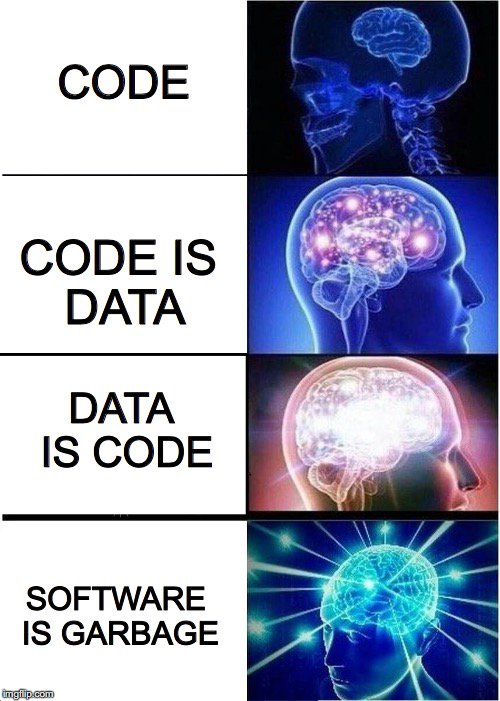
Ultimately, I hope not to lose the joy that programming brought me in school and when working on projects of my own choosing at the Recurse Center. But still being less than a month removed from my negative experiences in the software industry, I’m hoping to spend only a minority of my time at SFPC writing code, and a greater proportion making things with my hands. I’ve also been learning to draw, and I also intend to write some poetry and study the basics of making electronic music. I’ve played several instruments since I was very young – mostly piano these days, although I didn’t start learning the keys until I was 17 – and I’ve also been writing code since high school. But those two interests of mine have always been wholly separate. I’m glad for the opportunity to bring them together! It is a beautiful thing to having the space and freedom to work on artistic explorations of my own choice while surrounded with like-minded and positive people who have a lot to teach me.
All that downer stuff about software and the industry said, I very much enjoyed the first week of Zach’s class. It is called “Recreating the Past” and in it, we study the work of influential computational artists, and either imitate or respond to them. I’m glad for the opportunity to use code to create visual art, an area I’ve long considered a major weakness of mine, and I think it will nicely complement my independent study of drawing and other classical visual arts. You can play with my first homework here. It is an interactive response to this work by Vera Molnár:
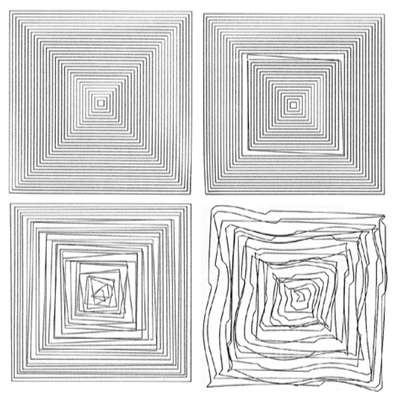
I could certainly imitate her work more closely, enhance the very limited interactivity, or implement any of a few ideas for completely different directions I could take my own work. For now, a more pressing concern is my yet incomplete second homework, which is to imitate or respond to a work of John Whitney. Like many people who did early and important work in computational art (and computing in general), he was associated with the U.S. military, which I oppose. I’m not yet sure what this means for how I relate to his work and the genre in general. I expect that I’ll have more thoughts on this point in the future.
Finally, on Wednesday February 28th, we had a salon with some interesting outside speakers. I particularly enjoyed hearing Tega Brain speak about “Smell Dating”, and Darius Kazemi criticizing some of the evasive and dishonest liberal discourse blaming Russia and bots for amerikkka’s homegrown problems. (To the extent we can call the racism and related issues of a settler colony “homegrown.”)
hardware week
For a more comprehensive look at this week, see the official blog post, this time written by my friend and classmate Sukanya.
Our third week was an intensive week of studying electronics, led by Taeyoon Choi, with one guest class taught by Pedro Oliveira on handmaking a one-bit computer.
I’m a huge fan on the hands-on approach of this class. We did study some fundamental theory useful to circuit design, such as Ohm’s law. Working with another student, I drew some designs of how to build other logical operators including AND, OR, and NOT from NAND, proving to myself the fact I had long accepted on others’ word that the NAND gate is universal.
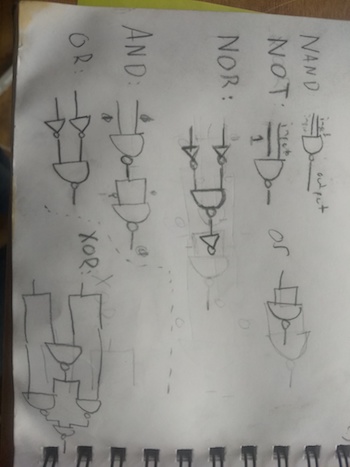
A memorable moment in class involving Taeyoon and Ed, our TA, was beautifully captured by my classmate Syd in this sketch:
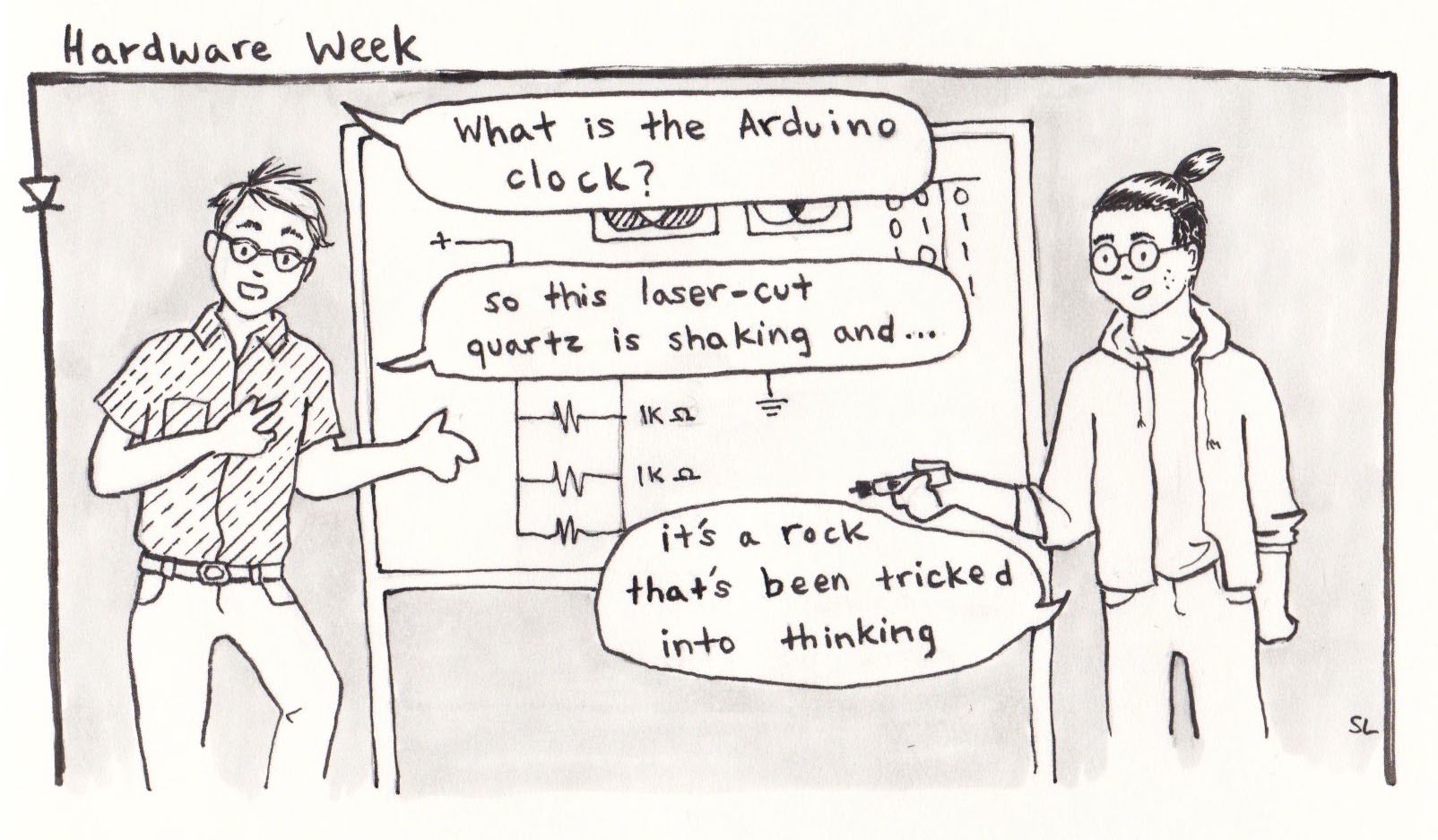
But the most educational piece, in my view, was actually building circuits: on paper, using a breadboard, and soldering together the one-bit computer mentioned above.
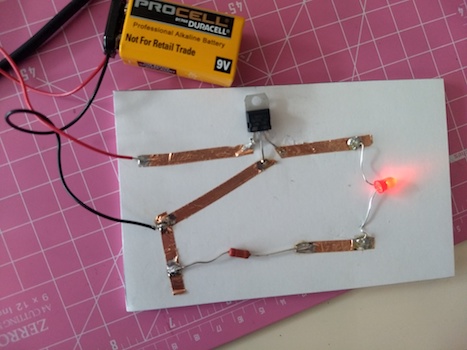
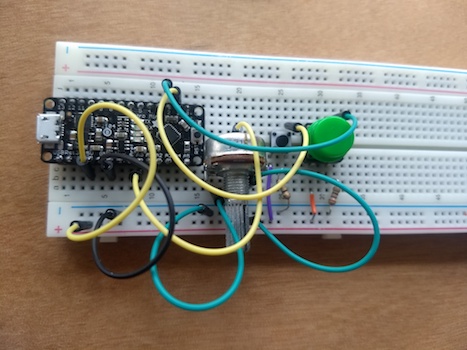
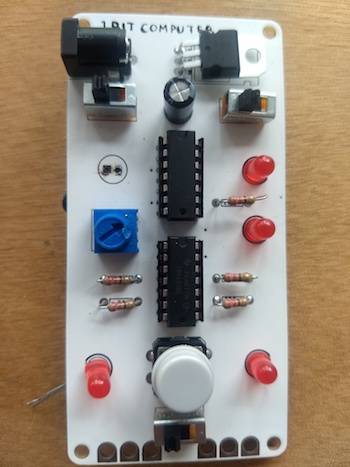
This manner of teaching and learning is quite contrary to that taken in, for example, my completely lecture and paper test based computer architecture class from college. I think quite a bit more about how computers physically work stuck in my mind this time around, thanks to this methodology, despite far less time spent on instruction and independent work combined. It was also nice to gain more experience and confidence using some tools of electronics and circuits.
Besides the high quality of the classwork itself, I really admire and appreciate Taeyoon’s openness with us about the realities of making a living as an artist, and the other work he does besides SFPC. He has invited us into many other spaces and I’m grateful for the connections I’ve already made, and will continue to make, because of his generosity in connecting us to other people and resources.
Also during this week, I brought my piano keyboard there and enjoyed a nice jam session with a couple other students who play saxophone and bass. It was a lot of fun to play together! I’ve gotten too used to playing music alone.
meet the students
Besides class, a highlight of this past week was our meet the students event on Tuesday March 6th. Everyone was very honest in their presentations, which you can watch in full here. All of them are worth watching in my opinion to give you a full sense of our group. I presented first out of us students, following an introduction from Taeyoon:
To even more briefly summarize an already brief four or five minutes: I spoke about a few things I’ve done in the past, most of which I already mentioned above, besides my paid work in public schools and my unpaid organizing work for police and prison abolition in the movement for Black lives here in NYC. I mentioned the frequency of my thoughts about the connections between technology and imperialism, with prompts including the space SFPC currently occupies, which was once associated with Bell Labs, an important company in software history with close military associations. I also spoke briefly about other histories of this space, including the indigenous Lenape people and the radical queer Black presence in the West Village, most famous as the site of the Stonewall uprising against the police. I spoke about my identification with my neighborhood and how distant Manhattan can feel, silly as it may sound to those traveling from halfway around the world rather than biking distance.
I then spoke about my socialist political views, including my contempt for all billionaires and particularly Elon Musk’s attempts to export racism and sexism to space. I shared the following image by the great Black artist Emory Douglas, who produced it as part of his work for the Black Panther Party:
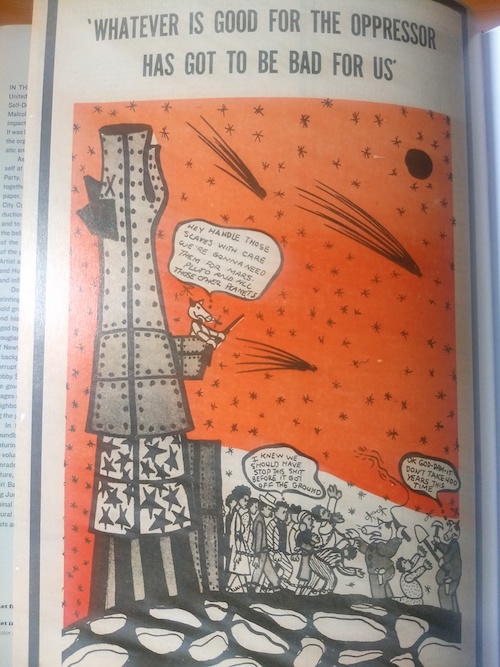
And I played an excerpt from Gil Scott-Heron’s poem “Whitey on the Moon”:
I spoke about my identification with Black political art traditions and my disconnection from museums and similar spaces. I raised the history of CIA funding abstract art, and mentioned my unsureness of how to relate to the work of computational artists. I discussed the difficulty as a colonized person trying to learn to make art not to view my own culture through the oppressor’s lens. I confessed frankly that I have little idea what I will produce for our final showcase. I spoke of my desire to avoid returning the software industry, and my need for work in the second half of this year. Finally, I shared a few things I have coming up, which I will mention below in the last section of this reflection.
looking forward
The next five weeks will not be structured as week-long intensives as the previous two were, but rather, each of our four tracks will have one day a week devoted to it. (All students take every track that SFPC offers, a structure I strongly support.) Besides software and hardware, the remaining tracks are craft (making things with our hands!) and critical theory.
After that, class ends and we spend all of our time preparing for our final showcase on April 20-22. Mark your calendar for at least one of the three dates! So far I have only the vaguest ideas of what I might wish to build and show. To find out, come in person to 155 Bank Street or view the livestream (link forthcoming!)
Outside SFPC, a few other things I have coming up include co-organizing !!con here in NYC on May 12-13, speaking at deconstructconf on May 21st or 22nd in Seattle, and publishing my longest yet political article after months of agonizing research and writing. It is called “Ecological Prospects for Computing” and will appear in the forthcoming issue #10 of The Recompiler, due in print in May and online in June. Stay tuned!
To conclude this reflection, I will share some thoughts prompted by a rhyme from Killer Mike that I’ve had many previous opportunities to consider.
You really made it or just became a prisoner of privilege?
You willing to share that information that you been given?
Despite my negative feelings towards the software industry, the savings I accumulated during my time working in it are the only reason I am able to pay tuition for SFPC ($5500 altogether) as well as continue paying my rent while working only part-time during these ten weeks. This leaves me feeling ambiguous about some of the other activities I engage in, such as volunteering at a high school in my neighborhood teaching introductory web development with ScriptEd, a nonprofit dedicated to getting underrepresented groups such as Black people into careers in technology. I’m not sure how much sense it makes for me to invest energy in getting others into spaces I dislike and am trying to leave. On the other hand, it’s not like I think many other careers are too likely to be fun or free of racism either, and since until we overthrow capitalism they’re going to have to work in one or another of these industries, I certainly don’t wish to pull shut behind me a door I was able to benefit from passing through.
And of course, the whole point (or at least part of the point) of SFPC is that there are many possibilities for how to use the technical skills I’ve been developing besides churning out some the latest terrible app idea for some venture capitalist. I hope to have the opportunity to share with my students some of the enormous possibilities of today’s technology beyond those directed by the ruling class for their own benefit – possibilities I’m yet in the early stages of understanding and contributing to, myself. As a relatively class privileged Black person, it is necessary for me to find ways to be accountable to others in my community to avoid the temptations decribed by past revolutionary leaders. Sharing this information that I’ve been given is a part of that process. More to come.